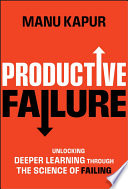

One of the central themes of 'Productive Failure' is the notion that failure is not merely a setback but a crucial component of the learning process. The authors argue that when individuals confront complex problems without prior knowledge, they often struggle and fail to find the correct solution. However, this struggle is valuable. It engages critical thinking and problem-solving skills, fostering deeper understanding and retention of knowledge. By experiencing failure, learners can identify gaps in their understanding, which leads to more effective learning in the long run. This idea challenges traditional perspectives that view failure as something to be avoided, instead presenting it as an essential step toward mastery and innovation. The book illustrates this concept with various case studies and educational experiments, showing that when students are allowed to grapple with difficult problems, they often perform better when later presented with similar tasks, compared to those who receive direct instruction first.
Continue readingThe authors introduce the concept of 'productive struggle,' which refers to the process of working through challenges that are neither too easy nor impossibly difficult. This struggle is necessary for developing resilience and problem-solving skills. In educational contexts, when students engage in productive struggle, they are more likely to develop a growth mindset, understanding that effort and persistence can lead to success. The book discusses how educators can create environments that encourage productive struggle, emphasizing the importance of supportive feedback and collaborative learning. By fostering a culture where struggle is seen as a natural part of the learning journey, educators can help students build confidence and competence in their abilities.
Continue readingContext plays a critical role in how individuals learn from failure. 'Productive Failure' emphasizes that the environment in which failure occurs can significantly influence the lessons learned from that experience. For instance, a supportive and understanding environment can help individuals analyze their failures constructively, leading to insights and improvements. Conversely, a punitive or overly critical atmosphere can lead to disengagement and fear of taking risks. The authors advocate for creating learning contexts that encourage exploration and experimentation, allowing individuals to view failure as a stepping stone rather than a dead end. This idea is particularly relevant for educators and leaders who want to cultivate a culture of continuous learning and innovation.
Continue readingFeedback is a crucial element in the cycle of learning from failure. The authors discuss how timely and constructive feedback can help individuals reflect on their mistakes and understand the reasons behind their failures. Effective feedback should focus not only on what went wrong but also on how to improve. The book provides strategies for delivering feedback that encourages reflection and growth, highlighting the importance of asking guiding questions that prompt deeper thinking. By integrating feedback into the learning process, individuals can develop a clearer understanding of their strengths and weaknesses, ultimately leading to better performance in future endeavors.
Continue readingA significant idea presented in 'Productive Failure' is the shift from performance-oriented goals to learning-oriented goals. Performance goals focus on demonstrating ability and achieving specific outcomes, often leading to a fear of failure. In contrast, learning goals prioritize the acquisition of knowledge and skills, which can foster a more resilient attitude toward setbacks. The authors argue that by encouraging learners to set learning goals, educators and leaders can create an environment where experimentation is valued, and failure is seen as an opportunity for growth. This shift is essential for developing a culture of innovation, where individuals are willing to take risks and explore new ideas without the fear of negative repercussions.
Continue readingCollaboration is a key component of productive failure. The book highlights how working with peers can enhance the learning experience, particularly when it comes to navigating failure. Collaborative environments allow individuals to share their struggles and insights, leading to collective problem-solving and deeper understanding. The authors discuss various collaborative learning strategies, such as group discussions and project-based learning, that can help individuals learn from each other's failures and successes. By fostering a sense of community and shared learning, educators and leaders can create a supportive atmosphere where individuals feel safe to experiment and learn from their mistakes.
Continue readingThe final key idea in 'Productive Failure' is the importance of cultivating a growth mindset. A growth mindset is the belief that abilities and intelligence can be developed through effort, learning, and persistence. The authors argue that fostering a growth mindset is essential for embracing failure and viewing it as a part of the learning process. They provide strategies for educators and leaders to encourage a growth mindset among learners, such as celebrating effort, encouraging risk-taking, and reframing failure as a learning opportunity. By instilling a growth mindset, individuals are more likely to engage in productive struggle and view challenges as opportunities for growth rather than threats to their self-esteem.
Continue readingThe reading time for Productive Failure depends on the reader's pace. However, this concise book summary covers the 7 key ideas from Productive Failure, allowing you to quickly understand the main concepts, insights, and practical applications in around 22 min.
Productive Failure is definitely worth reading. The book covers essential topics including The Value of Failure in Learning, The Role of Productive Struggle, Importance of Context in Learning, providing practical insights and actionable advice. Whether you read the full book or our concise summary, Productive Failure delivers valuable knowledge that can help you improve your understanding and apply these concepts in your personal or professional life.
Productive Failure was written by Manu Kapur.
If you enjoyed Productive Failure by Manu Kapur and want to explore similar topics or deepen your understanding, we highly recommend these related book summaries:
These books cover related themes, complementary concepts, and will help you build upon the knowledge gained from Productive Failure. Each of these summaries provides concise insights that can further enhance your understanding and practical application of the ideas presented in Productive Failure.